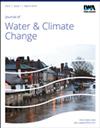整合机器学习和水动力建模,解决洪水深度估算中的外推法问题
IF 3.1
4区 环境科学与生态学
Q2 WATER RESOURCES
引用次数: 0
摘要
洪水预测是一项重要任务,可帮助地方决策者采取有效措施,减少对人民和经济造成的损失。目前,大多数研究使用机器学习来预测特定地区的洪水;然而,外推法问题被认为是使用这些技术时的一大挑战,很少有人对此进行研究。因此,本研究将重点探讨在 MIKE FLOOD 下,通过整合机器学习(XGBoost、Extra-Trees (EXT)、CatBoost (CB) 和 Light gradient boost machines (LightGBM))和水力模型,解决洪水深度预测中的外推问题。结果表明,水力模型能很好地提供建立机器学习模型所需的洪水深度数据。在提出的四个机器学习模型中,XGBoost 在解决洪水深度估算的外推法问题方面表现最佳,其次是 EXT、CB 和 LightGBM。广平省遭受的洪水深度从 0 米到 3.2 米不等,洪水深度较高的地区主要集中在两条主要河流(吉安河和 Nhat Le 河 - 建江省)的沿岸和下游。本文章由计算机程序翻译,如有差异,请以英文原文为准。
Integration of machine learning and hydrodynamic modeling to solve the extrapolation problem in flood depth estimation
Flood prediction is an important task, which helps local decision-makers in taking effective measures to reduce damage to the people and economy. Currently, most studies use machine learning to predict flooding in a given region; however, the extrapolation problem is considered a major challenge when using these techniques and is rarely studied. Therefore, this study will focus on an approach to resolve the extrapolation problem in flood depth prediction by integrating machine learning (XGBoost, Extra-Trees (EXT), CatBoost (CB), and light gradient boost machines (LightGBM)) and hydraulic modeling under MIKE FLOOD. The results show that the hydraulic model worked well in providing the flood depth data needed to build the machine learning model. Among the four proposed machine learning models, XGBoost was found to be the best at solving the extrapolation problem in the estimation of flood depth, followed by EXT, CB, and LightGBM. Quang Binh province was hit by floods with depths ranging from 0 to 3.2 m. Areas with high flood depths are concentrated along and downstream of the two major rivers (Gianh and Nhat Le – Kien Giang).
求助全文
通过发布文献求助,成功后即可免费获取论文全文。
去求助
来源期刊

Journal of Water and Climate Change
WATER RESOURCES-
CiteScore
4.80
自引率
10.70%
发文量
168
审稿时长
>12 weeks
期刊介绍:
Journal of Water and Climate Change publishes refereed research and practitioner papers on all aspects of water science, technology, management and innovation in response to climate change, with emphasis on reduction of energy usage.
 求助内容:
求助内容: 应助结果提醒方式:
应助结果提醒方式:


